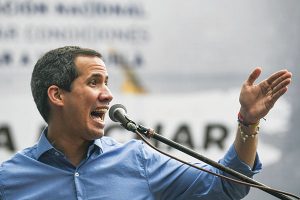Bloomberg
Venezuelan opposition political parties extended Juan Guaido’s mandate as the country’s interim president, but in a more limited capacity that deals a blow to the US-backed effort to confront President Nicolas Maduro.
The opposition’s legislative body, following up on December 27’s preliminary approval, voted to amend a governing statute in order to extend its own term for another year and leave Guaido in place as its president. “Our commitment to Venezuelans’ defense, the possibility of solutions to the crisis and international dialogue to achieve it was ratified today,†Guaido tweeted after the reform was approved.
The opposition’s moves represent a mixed outcome for Guaido. On the one hand, his role as interim president will be reduced to “defending democracy†and directing the protection of assets in foreign countries including US oil refiner Citgo Holding Inc. and gold worth $1 billion stored in the Bank of London. Yet, the evening’s outcome also represents a reprieve as he was set to lose power from Jan. 5 if the assembly had done nothing.
Guaido, 38, is recognized as Venezuela’s rightful leader by several foreign governments, including the US and UK, which gives him control over Venezuela’s state assets in those countries.
He consolidated the backing of the country’s opposition parties and international governments, including the US, in January 2019, vowing to topple Maduro. Yet, three years later Maduro remains firmly in control. Guaido’s support, meanwhile, within the country has fallen to 45% as of October 2021 from 61% in early 2019, according to Datanalisis surveys.
Several countries have backed away from continuing to recognize him. The European Union stopped referring to Guaido as interim president after the widely criticized National Assembly elections in 2020, choosing instead the term “privileged interlocutor.â€
US officials have said they’ll continue to support him as they don’t recognize Maduro after he won what they consider fraudulent elections in 2018.
The fractured opposition decided to compete in regional elections in November 2021 after boycotting previous votes. Although it performed better than in previous elections, the government’s Socialist Party won the majority of seats up for grabs, extending Maduro’s grip over key local authorities. International observers, however, raised concerns about the fairness of the vote.
 The Gulf Time Newspaper One of the finest business newspapers in the UAE brought to you by our professional writers and editors.
The Gulf Time Newspaper One of the finest business newspapers in the UAE brought to you by our professional writers and editors.
